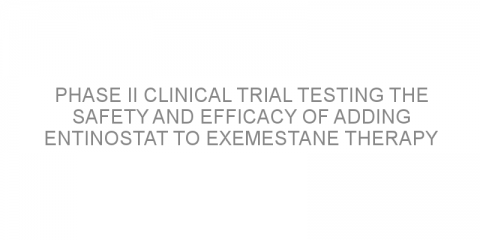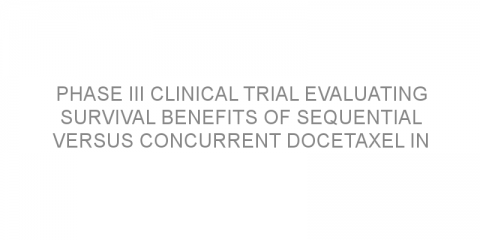In a nutshell This phase II clinical trial tested whether a new drug, entinostat, can work in concert with exemestane (a hormone therapy drug), to fight breast cancer that no longer responds to hormone therapy alone. Some background Some breast cancers need estrogen (a female sex hormone) to grow. These breast cancer cells respond to estrogen via...
Read MoreCurrent stage?-Stage III Posts on Medivizor
Phase 3 clinical trial evaluating the safety and efficacy of adding docetaxel to doxorubicin and cyclophosphamide chemotherapy in node positive breast cancer patients
In a nutshell In this phase 3 clinical trial, two types of adjuvant (a treatment given in addition to a main treatment) chemotherapy regimens were compared in women with node positive breast cancer after surgery to remove the cancer. These were the combination of docetaxel (Taxotere), doxorubicin and cyclophosphamide (TDC) or the combination of...
Read MoreEvaluating survival benefits for adding zoledronic acid to chemotherapy in stage II and III breast cancer patients
In a nutshell This study evaluated whether zoledronic acid (Zometa) can help reduce recurrence (return of the cancer) and improve survival for patients with stage II/III breast cancer (BC). Some background Stage II and Stage III BC is cancer that has spread to the lymph nodes around the breast (under the armpit or above collarbone), but not...
Read MorePhase III clinical trial evaluating survival benefits of sequential versus concurrent docetaxel in doxorubicin-based chemotherapy in node-positive breast cancer patients
In a nutshell This phase III clinical trial evaluated the survival benefits after the addition of docetaxel into doxorubicin-based chemotherapy in node-positive breast cancer patients. Some background Node-positive breast cancer means that the cancer has spread to the lymph nodes near the breast such as under the arm or above the collarbone. Women...
Read MoreCan a scoring system called a nomogram help develop a treatment program that is individual to each patient?
In a nutshell This article is a short editorial describing how the use of a “nomogram” (a predictive tool based on a points system) could provide a doctor and patient with possible outcomes if different treatment options are selected. Some background The current method of choosing treatment for patients with rectal cancer is fairly...
Read MoreEvaluating the benefits of adjuvant radiotherapy after therapeutic lymphadenectomy for melanoma patients with positive lymph nodes
In a nutshell The present study compared the outcomes between patients with clinically advanced melanoma spread to the lymph nodes who underwent therapeutic lymphadenectomy (TL) alone, or TL with regional radiation therapy. Some background Melanoma spread to the nearby lymph nodes is also called lymph-node metastatic melanoma. The treatment for...
Read MoreEvaluating relapse patterns in stage III melanoma patients
In a nutshell The present article evaluated the time interval and site of relapse (return of the cancer) as well as survival rates in stage III melanoma patients who were considered cured after treatment. Some background Stage III melanoma is skin cancer that has spread to the nearby lymph nodes. Further classification (III A, III B and III...
Read MoreNew whole body treatments for advanced cutaneous cancer
In a nutshell This article published in 2013 reviews information from clinical studies which looked at new treatments for cutaneous melanoma. These include drugs that aim to stimulate the body's anti-tumor immune response, such as ipilimumab (Yervoy) and tremelimumab and those that target genetic mutations in cancer cells. Some background...
Read MoreEfficacy of anti-PD-1 drugs on cancer regression
In a nutshell This review provided the long-term outcomes of the first human trial of the anti-PD-1 drug BMS-936558. It also evaluated whether restarting therapy for cancer recurrences can be effective. Results showed that anti-PD-1 drugs have clinical potential. Some background The PD-1 protein (or "programmed cell death-1" protein)...
Read MorePreoperative Magnetic Resonance Imaging can predict good outcomes for rectal cancer patients treated with surgery alone
In a nutshell The present study examined the survival rate of rectal cancer (RC) patients treated with surgery alone, based on preoperative Magnetic Resonance Imaging (MRI) staging predictive of a good prognosis. Some background RC is staged according to how far the cancer has spread through the walls of the rectum (the final section of...
Read MoreThe right treatments are available if the correct trials are used to show that therapy is improving.
In a nutshell This editorial article published at The Journal of Clinical Oncology, expresses experts' opinion, criticizing the current practice and design of clinical trials involving patients with rectal cancer. Some background Despite improvements in treatment options, such as the addition of the platinum-based drug Oxaliplatin to...
Read MoreCan patients with rectal cancer be treated with pre-operative chemoradiation alone?
In a nutshell The present study evaluated the outcomes of patients with rectal cancer who were treated with non-operative management (NOM) after complete clinical response (cRC) to neoadjuvant chemoradiation (nCRT). Some background Rectal cancer involves the final part of the large intestine, or rectum. The first choice of treatment for...
Read More














